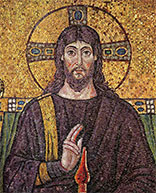'The Springboard of Europe' granted funding
Ravenna, the northern Italian town from which Julius Caesar led his troops across the Rubicon, is to be the subject of Professor Emerita Judith Herrin’s new book Ravenna – The Springboard of Europe, thanks to a $435,000 grant from the Ahmanson Foundation.
Professor Herrin will trace a significant portion of this pivotal city’s history by analysing the forces that made Ravenna the imperial capital of the West almost fifty years later - from the fifth to the eighth century AD - when it was governed by a succession of emperors, kings and exarchs.
The book will set that development in the much broader context of Mediterranean history, tracing the Constantinopolitan models and associated Byzantine influence in Ravenna, and integrating the city’s history within the wider Christian development of the early Middle Ages.
It will draw on all forms of evidence, written and art historical, including the results of recent archaeological activity, to document the role of Ravenna in the transition from the late antique to the medieval world. Situated at the centre of this critical process of change, Ravenna becomes the springboard for nascent Europe, transmitting influence from both East and West through Northern Italy and across the Alps to the emerging new world of Charlemagne. The volume will form a compelling introduction to this thrilling process, seen through the lens of a single city.
Judith was Professor of Late Antique and Byzantine Studies in the Department of Byzantine and Modern Greek Studies (now the Centre for Hellenic Studies) and the Department of Classics from 1995 to 2009, and subsequently Constantine Leventis Senior Research Fellow in the Centre until 2013. Her book The Formation of Christendom, first published in 1987, has long been a classic. More recently Byzantium: The Surprising Life of a Medieval Empire (2006) has been a bestseller in Penguin and been translated into a dozen languages.